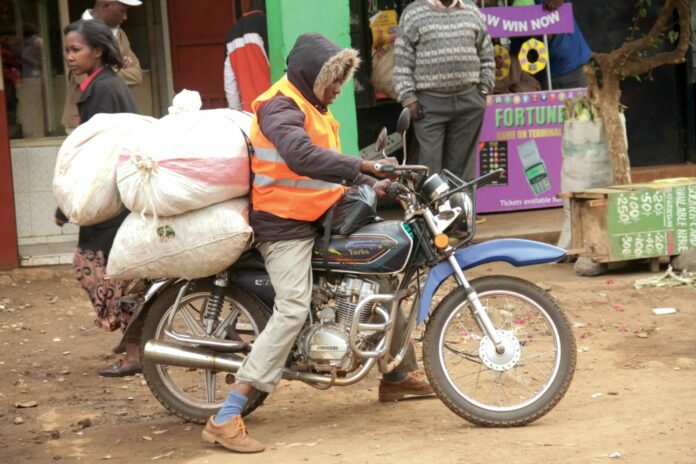The Public Transport Motorcycle Regulation Bill, 2023, is set to bring significant changes to Kenya’s boda boda industry. The bill, recently tabled in the Kenya parliament, has sparked mixed reactions, with its strict measures aimed at restoring order in the often-chaotic sector.
The Boda Boda Association of Kenya has already threatened nationwide protests if parliament approves the proposed legislation.
Bizna Kenya breaks down its key proposals.
Harsh penalties for mob attacks by boda boda riders
One of the most talked-about provisions is the proposed fine of up to KSh 100,000 or imprisonment for a year for motorcycle riders who gang up against motorists or any other member of the public.
This practice, commonly witnessed across the country, has caused numerous tragedies, resulting in the loss of lives and destruction of property.
By criminalizing this mob mentality, the bill aims to deter acts of intimidation, threats, and harm, and restore confidence in the public transport system.
Real-time tracking devices to curb crime
Another major proposal requires that all commercial motorcycles to be fitted with real-time tracking devices. This move is designed to stem rising crime rates, with boda bodas frequently linked to theft, violent robberies, and quick getaways.
The bill mandates that every motorcycle must have a security device approved by the county executive committee member.
Annual registration for commercial motorcycles
The bill also introduces stringent registration requirements. All motorcycles used for commercial purposes must be registered annually, with applications made to the county executive committee member upon payment of prescribed fees.
A copy of the updated register will be submitted to the relevant authority every three months, ensuring oversight and accountability.
Mandatory cooperative society membership for boda boda
Motorcycle owners are required to join cooperative societies recognized under the Cooperative Societies Act. The bill makes it clear that such membership must not be used to form gangs or cartels.
This provision seeks to formalize and organize the industry, offering a layer of financial security and collective bargaining without encouraging criminal networks.
Training is another key component of the bill
Riders must complete an approved training course covering safe riding, traffic laws, emergency handling, maintenance, and security awareness.
The training can be conducted in local languages, and certificates will be issued upon completion. This emphasis on education aims to create more responsible and skilled boda boda riders, ultimately improving road safety.
Motorcycle owners have their share of responsibilities too. They must ensure that their riders have valid driving licenses, provisional licenses, and employment contracts.
Owners are also tasked with enforcing helmet use, passenger limits, seating arrangements, and adherence to traffic rules.
Stricter lane rules and passenger safety measures
For the riders, compliance goes beyond licenses. The bill prohibits lane splitting near junctions or high-speed areas, a common practice that often leads to accidents.
Passengers, meanwhile, must wear helmets and reflective jackets, with the law allowing only one adult passenger per motorcycle.
An exception is made for a child under 13, who may sit between the rider and an adult passenger.
The bill even addresses engine capacity restrictions, stipulating that no three-wheeled motorcycle, commonly referred to as tuk-tuk, with an engine capacity exceeding 250cc can operate on a public road without authorization.
Additionally, clear guidelines are set for the carriage of loads, limiting width, height, weight, and rear projection to maintain road safety.
Special provisions for motorcycle ambulances and delivery motorcycles also feature in the legislation. Motorcycle ambulances must have medical equipment approved by health authorities and be operated by trained medical personnel, while delivery motorcycles are to be regulated separately, with designated routes and parking areas to streamline urban logistics.
Government offers loans of up to Sh300,000 to select jobseekers
Mandatory insurance and stiff penalties for traffic violations
Motorcycle insurance is also mandatory. Every owner must have at least a motor commercial public service vehicle insurance cover, ensuring that victims of accidents or incidents are adequately compensated.
The bill outlines various penalties for offences such as riding on pavements, pedestrian walkways, or against traffic flow on one-way streets. These infractions attract fines of up to Sh 20,000 or imprisonment for six months, or both.
This proposed legislation signals a turning point for Kenya’s boda boda industry if it is assented into law and enforced thoroughly.
However, laws alone don’t have the capacity to change behavior since Kenya has similar laws governing motor vehicle transport, but the sector remains plagued by rogue behavior and discord. Kenya’s public transport sector, popularly called the matatu industry, remains the hardest hit.
Enforcement and a change in societal attitude will matter a lot for these new regulations to work for the good of Kenya’s boda boda sector.
Some riders and stakeholders have already raised concerns about the financial and logistical implications; many others see it as a long-overdue effort to bring order, safety, and professionalism to a sector that plays a crucial role in the country’s economy and daily life.









